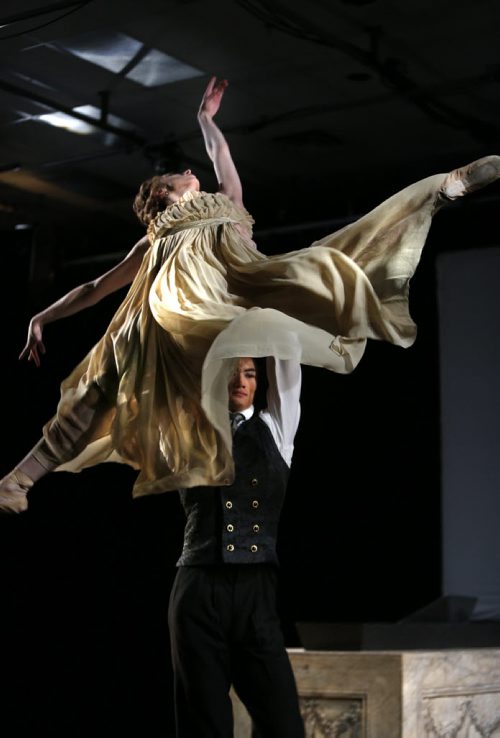Dracula: Past representations of this story weigh too heavily on this performance

Dracula, choreographed by Mark Godden, a production of the Royal Winnipeg Ballet.
Created in 1999 and performed for the first time at the opening of the 2005/06 Season of the Company, it also came to the NAC for the first time in 2006.
This was a ballet waiting to be staged with its luscious reputation of Gothic horror, based on Bram Stoker’s book (1897) that fueled so many exciting movies such as the Horror of Dracula which gave us the suave seductive count played by Christopher Lee, the first of a series of British films (1958 etc..) where we also met Peter Cushing as Ven Helsing. Also in the tradition was Murnau’s silent film Nosferatu in 1922 (starring Max Shreck) a later adaptation from Stoker’s character that caused years of court cases because the script was not officially authorized by Stoker. And since then, the legend has been recreated and reimagined by so many artists of the screen.
Perhaps because we have seen such excellent film versions of Dracula that our expectations on the stage were extremely high, making the balletic version even more difficult to attain because a corporeal language in space of this event would demand a complete reinvention of that form of dance, just as each of the films reimagined the cinematographic language needed to suit the extraordinary story of the evil Vampire.
However, the Royal Winnipeg Ballet’s production did not go that far and thus, the performance was , to my mind, rather disappointing. For someone who has been captivated by this horror fantasy and who has seen all the films related to the adventures of the bloody count but also for someone who loves ballet and has seen how classical steps have been reinvented by so many contemporary choreographers to suit new staged readings , it appeared that something was definitely missing.
Mark Godden’s vision of Dracula falls into the tradition of narrative ballets based on the exacerbated romanticism of the Gothic horror story and somehow none of that was captured strongly enough although a parody of the story (pantomime) is acted out at the beginning of Act II which was great fun and one wonders if that should not have been placed at the very beginning of the evening to locate the whole event as a huge sendup!
As it was, in the first few minutes of the performance, Dracula appears kissing (?) or discretely sucking on the neck of the beautiful Lucy who is placed on a pedestal in a trance-like state, already a victim of the monsters fangs as he is slowly feeding on her. Thus Dracula is revealed from the onset and then quickly shoved into the background because the essence of Acts I and II is immediately spread out before us , leaving us wondering if Dracula is really the centre of this performance or if it isn’t the strong female dancers who are his victims (Sarah Davey as Lucy and Sophia Lee as Mina). They are at the origin of the spectacular dancing during solos , group choreography and delightful pas de deux with Josh Reynolds who performed Dracula on opening night. Those moments of splendid choreography were the real highlights of the evening.
Sarah Davey (Lucy)already transformed into a vampire was lifted away out of her tomb by Dracula and the two of them become weightless creatures floating in the crypt as the evil creature caresses her , pulls her and forces her to drink his blood in gentle gestures that transformed the crypt into her place of eternal sleep. The seduction is complete. In Act II, Sophia Lee who has also danced Tracy in other performances, becomes Mina, the wife of Johnathan out to capture Dracula in the crypt of the count’s own chateau where she has come to liberate her husband. Bits and pieces borrowed from the novel do not necessarily work out very well especially when Scene I of act II take us through a fantasy of multiple monsters that is much more confusing than pleasing.
The final confrontation between Mina, and Dracula, as Sophie Lee rejects his advances , has her swept away across the stage, as she flies out of Dracula’s reach and transforms her body into a slowly evaporating creature, doing its best to resist the force of the Vampire who is covering her with waves of sensuality. During this moment of oncoming destruction, we felt the first vibrations of seduction coming from the vampire as he tries to force Mina to obey him but she is strong and she triumphs. The Crypt in the chateau takes us back to the final moments of the Horror of Dracula, the British movie inspired by Stoker’s novel but it did not have the same powerful impact because , in spite of the great beauty of Mahler’s music, the event was already too familiar and completely expected. The magic, the tension were removed.
The novel , the films, the spoken words, and all other elements that found their way into this stage event weighed almost too heavily on the ballet, and neutralized the world of the dance. Obviously the voice of the narrator made it easier for the audience to follow and sent us back to Johnathan’s journal. The dramatic lighting and the presence of the vampire women , were very fine to watch but it all seemed as though those moments were only trying to fill a void of corporeal language that had not yet been invented . Nevertheless, it is clear that this show was certainly a crowd pleaser and it appeared to work.
Dracula continues tonight and Saturday in Southam Hall, 20h00.